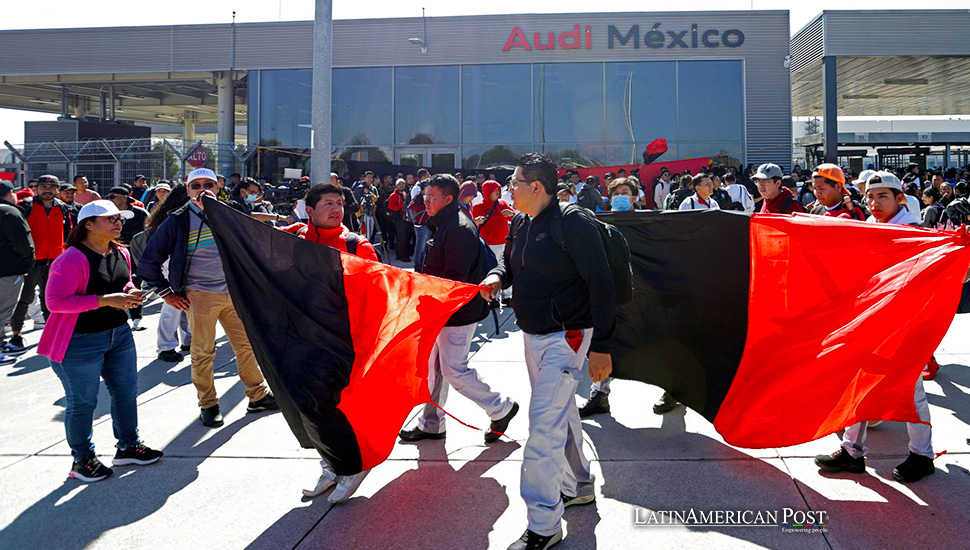Audi Mexico Workers Strike for Fair Wages Amid Negotiation Stalemate

Union workers at Audi’s Mexico unit initiated a strike, demanding a substantial wage increase after negotiations with the automaker reached an impasse, signaling growing labor unrest in the industry.
Striking for Fair Wages: Audi Workers Protest in Mexico
Union workers at Audi’s manufacturing unit in Mexico commenced a strike on Wednesday, marking a significant escalation in their ongoing dispute with the automaker over wage increases. The strike, involving approximately 1,000 workers, unfolded outside the Audi plant in Puebla, central Mexico, where protesters voiced their grievances under the rallying cry, “We are workers, not beggars.” This development reflects a growing tension in Mexico’s auto industry’s labor relations.
The core of the dispute lies in the disagreement over the proposed wage increase. Audi, a subsidiary of Volkswagen, offered a 6.5% raise, which the union promptly rejected, countering with a demand for a 15.5% increase. While not confirming the exact figures, union leader Cesar Orta emphasized the union’s commitment to continuing negotiations until a proposal that genuinely dignified the workers was reached.
Audi’s Response and Historical Context
In response to the union’s demands, Audi stated that a 15.5% increase was “beyond any comparative parameter,” suggesting that such a raise would be unprecedented and potentially unsustainable. Despite this stance, the company was willing to maintain an open dialogue with the union.
This strike comes against last year’s agreement between Audi and the Independent Union of Audi Mexico Workers, where a 9.4% salary raise was negotiated. This increase was one of the highest for automaker wages in Mexico in recent years, setting a precedent that may have fueled current expectations.
The crux of this conflict is not merely about percentages and numbers; it reflects a deeper issue within the global auto industry. Workers in Mexico, integral to the production lines of major international brands, are voicing their need for wages that reflect their contribution to the companies’ success. The disparity between the salaries of workers in Mexico and their counterparts in other countries has long been a point of contention.
According to company data, Audi’s plant in Puebla is a significant operation, employing around 5,000 workers. The outcome of this dispute will not only impact these employees but could set a precedent for labor negotiations across the industry in Mexico and potentially in other manufacturing hubs.
Broader Labor Trends: Mexico’s Shifting Landscape
The strike at Audi’s Mexico unit manifests broader labor trends within the country. Over the years, Mexican workers have increasingly demanded better pay and working conditions, challenging the longstanding narrative of Mexico as a low-cost manufacturing destination. Global trends partly influence this shift, with a growing emphasis on fair wages and ethical labor practices.
Moreover, the Mexican government’s recent labor reforms, aimed at strengthening unions and increasing transparency in labor negotiations, have emboldened workers to assert their rights more assertively. These reforms are part of the United States-Mexico-Canada Agreement, which includes provisions to ensure better labor standards in Mexico.
The outcome of this strike holds implications beyond the immediate interests of Audi and its workers. It will be closely watched by other multinational corporations operating in Mexico, as it could signal a turning point in labor negotiations in the country. A resolution favoring the workers could encourage similar actions across different sectors, potentially reshaping the labor landscape in Mexico.
For Audi, resolving this dispute is crucial to resuming operations at one of its vital manufacturing units and maintaining its reputation as a socially responsible employer. The automotive industry, already navigating challenges like supply chain disruptions and a shift towards electric vehicles, cannot afford prolonged labor disputes that could further impact production and corporate image.
Also read: Chilean retailer Falabella’s Strategic Investment: Balancing Retail and Digital Growth
The strike at Audi’s Mexico unit is a significant event in the evolving narrative of labor relations in the global auto industry. It highlights the growing assertiveness of workers in demanding fair compensation and the challenges multinational corporations face in balancing profitability with ethical labor practices. The resolution of this conflict will have far-reaching consequences, potentially influencing labor dynamics in Mexico and setting a precedent for future negotiations in the industry.





